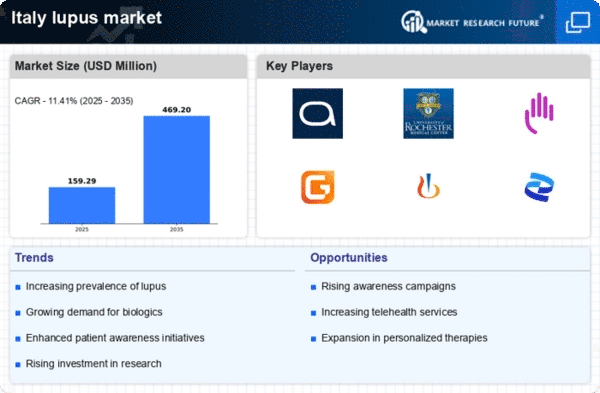Rising Incidence of Lupus
The increasing incidence of lupus in Italy is a critical driver for the lupus market. Recent studies indicate that the prevalence of lupus has risen by approximately 20% over the last decade. This rise is attributed to various factors, including environmental triggers and genetic predispositions. As more individuals are diagnosed, the demand for effective treatments and management options intensifies. Consequently, pharmaceutical companies are likely to invest more in research and development to address this growing patient population. The lupus market in Italy is thus expected to expand significantly, with an estimated market value projected to reach €500 million by 2027. This trend underscores the urgent need for innovative therapies and comprehensive care solutions to meet the needs of an increasing number of patients.
Advancements in Treatment Options
Innovations in treatment options for lupus are shaping the lupus market in Italy. The introduction of biologics and targeted therapies has revolutionized the management of lupus, providing patients with more effective and personalized treatment regimens. Recent data suggests that the market for biologics alone is expected to grow at a CAGR of 15% over the next five years. This growth is driven by the increasing recognition of the need for tailored therapies that address the unique manifestations of lupus in different patients. As healthcare providers become more aware of these advancements, the adoption of new treatment modalities is likely to accelerate, further propelling the lupus market forward. The ongoing research into novel therapeutic agents also indicates a promising future for patients suffering from this complex autoimmune disease.
Government Initiatives and Funding
Government initiatives aimed at improving healthcare access and funding for autoimmune diseases are influencing the lupus market in Italy. The Italian government has allocated increased resources to support research and treatment for chronic diseases, including lupus. In 2025, funding for lupus-related research is projected to exceed €30 million, reflecting a commitment to enhancing patient care and outcomes. These initiatives not only facilitate the development of new therapies but also promote awareness and education about lupus among healthcare professionals and the public. As a result, the lupus market is likely to benefit from improved diagnostic capabilities and treatment accessibility, ultimately leading to better management of the disease and enhanced quality of life for patients.
Integration of Digital Health Solutions
The integration of digital health solutions into the management of lupus is emerging as a significant driver for the lupus market in Italy. Telemedicine and mobile health applications are becoming increasingly popular among patients, allowing for better monitoring of symptoms and treatment adherence. Recent surveys indicate that approximately 40% of lupus patients in Italy utilize digital health tools to manage their condition. This trend not only enhances patient engagement but also provides healthcare providers with valuable data to tailor treatment plans effectively. As digital health solutions continue to evolve, they are expected to play a crucial role in improving patient outcomes and streamlining care processes within the lupus market.
Growing Patient Advocacy and Support Groups
The emergence of patient advocacy and support groups in Italy is playing a pivotal role in the lupus market. These organizations are dedicated to raising awareness about lupus, providing resources for patients, and advocating for better healthcare policies. Their efforts have led to increased visibility of the disease, which may contribute to earlier diagnosis and treatment. Furthermore, these groups often collaborate with healthcare providers and pharmaceutical companies to ensure that patient needs are prioritized in the development of new therapies. As the influence of these advocacy groups continues to grow, the lupus market is likely to see a shift towards more patient-centered care approaches, enhancing the overall treatment landscape for individuals living with lupus.
















